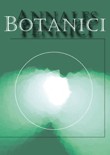
ANNALES BOTANICI FENNICI
Scope & Guideline
Advancing the Frontiers of Plant Science and Ecology
Introduction
Aims and Scopes
- Plant Taxonomy and Systematics:
The journal primarily publishes research related to the taxonomy and systematics of vascular plants, highlighting the identification and classification of new species, as well as the re-evaluation of existing taxa. - Nomenclatural Studies:
It places significant emphasis on nomenclatural research, including typifications, lectotypifications, and the resolution of taxonomic ambiguities, which are critical for maintaining a stable and universally accepted plant naming system. - Biodiversity Documentation:
The journal contributes to the documentation of biodiversity, particularly in under-studied regions such as Turkey, Iran, and various parts of Asia, providing valuable information on plant diversity and distribution. - Molecular Phylogenetics:
Recent publications have increasingly included molecular phylogenetic studies, which complement morphological assessments, thus providing a more comprehensive understanding of plant relationships and evolution. - Habitat and Ecological Studies:
The journal also explores morphological variability in relation to different habitats, enhancing the understanding of how environmental factors influence plant characteristics.
Trending and Emerging
- New Species Descriptions:
There has been a marked increase in the description of new species, with numerous papers dedicated to documenting previously unrecognized taxa, particularly from biodiverse regions. - Molecular Phylogenetics and Genomics:
An emerging trend is the integration of molecular phylogenetics, with studies utilizing genetic data to resolve taxonomic uncertainties and understand evolutionary relationships. - Regional Flora Studies:
The focus on regional flora, especially from less-explored areas like Kurdistan and the Western Ghats, has gained traction, contributing to the global understanding of plant diversity. - Invasive Species Research:
Research addressing the impact of invasive species and their management has increased, reflecting a growing concern about ecological balance and biodiversity. - Ecological Interactions:
Emerging themes include studies on the ecological interactions between species and their environments, enhancing the understanding of habitat-specific adaptations.
Declining or Waning
- Non-Vascular Plant Research:
There has been a noticeable decline in publications focusing on non-vascular plants, such as bryophytes and lichens, indicating a shift towards vascular plant studies. - General Ecology Studies:
The journal seems to be moving away from broader ecological studies that do not directly relate to taxonomy or systematics, focusing instead on specific taxonomic contributions. - Traditional Botanical Expeditions:
Research stemming from traditional botanical expeditions has decreased, possibly due to a greater emphasis on molecular and genetic studies over classical fieldwork.
Similar Journals
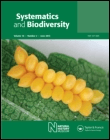
SYSTEMATICS AND BIODIVERSITY
Exploring biodiversity's complexities for a sustainable future.Systematics and Biodiversity, published by Taylor & Francis Ltd, is a prominent academic journal that provides a vital platform for advancing research in the fields of ecology, evolution, and plant science. With an ISSN of 1477-2000 and an E-ISSN of 1478-0933, the journal has established itself as a reputable source of scholarly information since its inception in 2003, and continues to publish cutting-edge studies through 2024. Recognized for its rigorous peer-review process, it holds a prestigious position in academic circles, reflected by its Q2 ranking in Ecology, Evolution, Behavior and Systematics and Q1 ranking in Plant Science as of 2023. The journal's contributions are further characterized by its strong performance in Scopus rankings, placing it in the 69th and 68th percentiles in its respective categories. Researchers, professionals, and students alike will find invaluable insights and innovative methodologies within its pages, making Systematics and Biodiversity an essential resource for those dedicated to understanding the complexities of biological diversity and systematics. The journal's impact factors and commitment to high-quality research underscore its significance in shaping the future of ecological and botanical studies.

NOVON
Exploring the Depths of Botanical KnowledgeNOVON is a premier scholarly journal published by the Missouri Botanical Garden, focusing on the intersection of botany and taxonomy, particularly within the fields of Ecology, Evolution, Behavior, and Systematics. Since its inception in 1994, NOVON has established itself as a vital resource for researchers seeking insight into plant science and related disciplines, reflected in its Q3 ranking in 2023 within both Ecology and Plant Science categories. With a commitment to advancing knowledge in these dynamic fields, the journal serves as a platform for innovative studies and significant findings. Although it currently operates without an open-access model, NOVON provides valuable contributions to the scientific community, fostering collaboration and dialogue among professionals and students alike. Located in St. Louis, Missouri, the journal plays a crucial role in enhancing our understanding of biodiversity and plant evolution, supporting the overarching objectives of conservation and ecological research.
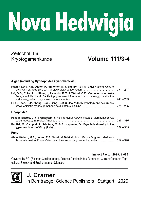
NOVA HEDWIGIA
Fostering Innovation in Natural Science ResearchNOVA HEDWIGIA is a premier journal dedicated to the fields of ecology, evolution, behavior, and systematics, as well as plant sciences. Published by GEBRUDER BORNTRAEGER in Germany, this journal serves as a vital platform for researchers, professionals, and students seeking to disseminate and engage with high-quality studies and findings. With an ISSN of 0029-5035 and an E-ISSN of 2363-7188, NOVA HEDWIGIA has established its significance within these disciplines, reflected in its current Scopus rankings, which place it in the third quartile of both ecology and plant science categories. This esteemed publication has contributed to the advancement of knowledge and innovation since its inception in 1993, continuing through 2024, offering valuable resources for an ever-evolving academic landscape. Researchers looking to contribute to ecological studies or plant sciences will find NOVA HEDWIGIA an ideal venue for sharing their work, nurturing their academic pursuits, and joining a community passionate about the natural sciences.
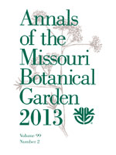
ANNALS OF THE MISSOURI BOTANICAL GARDEN
Fostering Innovation in Plant Biology and ConservationANNALS OF THE MISSOURI BOTANICAL GARDEN is a prestigious, peer-reviewed journal published by the Missouri Botanical Garden, focusing on the rich disciplines of Ecology, Evolution, Behavior, and Plant Science. With a storied history dating back to 1946, this journal has evolved to become a significant platform for scholars and professionals to disseminate research that informs global understanding of plant biology and conservation. Ranked in the Q2 category for both Ecology and Plant Science in 2023, it boasts commendable standings within the Scopus rankings, placing it in the 66th percentile for Plant Science and the 65th percentile for Ecology, Evolution, Behavior, and Systematics. The journal's commitment to rigorous scientific standards ensures that it remains a vital resource for those seeking to explore vital ecological and botanical research. As a product of the esteemed Missouri Botanical Garden, the journal serves researchers, professionals, and students alike, encouraging collaboration and innovation in the plant sciences community.

European Journal of Taxonomy
Fostering collaboration in the study of biodiversity.The European Journal of Taxonomy is a distinguished open access journal, published by the MUSEUM NATL HISTOIRE NATURELLE in France, dedicated to the rich and dynamic field of taxonomy, ecology, and systematics. Since its inception in 2011, this journal has aimed to provide a platform for the dissemination of high-quality research and innovative methods relevant to the study of biodiversity and species classification. With a commendable Q2 ranking in the Ecology, Evolution, Behavior and Systematics category as of 2023, the journal ranks 380 out of 721 in Scopus, highlighting its pivotal role in advancing scientific knowledge in these essential areas. Researchers and students alike will find valuable resources and contributions that address pressing ecological and evolutionary questions from 2015 to 2024. By promoting open access, the European Journal of Taxonomy ensures that vital research is accessible to a broader audience, fostering collaboration and discourse among professionals striving to enhance our understanding of the natural world.
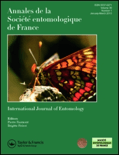
ANNALES DE LA SOCIETE ENTOMOLOGIQUE DE FRANCE
Fostering innovation in insect science and ecology.ANNALES DE LA SOCIETE ENTOMOLOGIQUE DE FRANCE, published by Taylor & Francis Ltd, is a prestigious journal that focuses on the dynamic field of entomology, offering a platform for the dissemination of innovative research related to insect science and ecological systems. With an increasing impact factor and notable quartile rankings (Q2 in both Ecology, Evolution, Behavior and Systematics, and Insect Science), the journal serves as a vital resource for researchers, professionals, and students alike, stimulating advances in our understanding of insect biology and its implications for broader ecological contexts. Although it is not an Open Access journal, it boasts a strong reputation within the academic community, as evidenced by its significant Scopus rankings and a commitment to high-quality peer-reviewed content. With its extensive historical archive since 1988 and a continuous publication schedule through 2024, ANNALES DE LA SOCIETE ENTOMOLOGIQUE DE FRANCE remains an essential reference for those engaged in the study of entomology and related ecological fields. For more information, visit the publisher's site at Taylor & Francis Ltd.

TELOPEA
Navigating the Complexities of Ecology and EvolutionTELOPEA is a distinguished scholarly journal published by the Natl Herbarium New South Wales, focusing on the rich fields of Ecology, Evolution, Behavior, and Systematics, as well as Plant Science. With an ISSN of 0312-9764 and an E-ISSN of 2200-4025, the journal has been a significant contributor to the understanding of plant biodiversity and ecosystem dynamics since its inception in 1984, with regular publication resuming in 2006 through to 2024. Residing in the beautiful Australian Botanic Garden at Mount Annan, NSW, TELOPEA operates under a Q3 ranking for both Ecology and Plant Science as of 2023, reflecting its relevance and contribution to these critical scientific disciplines. Though it does not offer open access, the journal remains an essential resource for researchers and professionals seeking to contribute to and stay abreast of the latest developments in plant sciences and ecological research. With a commitment to rigorous peer review and the dissemination of high-quality research, TELOPEA stands as a vital platform for advancing knowledge in the realm of plant ecology and systematics.

KOREAN JOURNAL OF PLANT TAXONOMY
Discovering the intricate tapestry of plant taxonomy.Korean Journal of Plant Taxonomy, published by the Korean Society of Plant Taxonomists, serves as a pivotal platform for researchers and professionals in the fields of plant taxonomy and ecology. With an ISSN of 1225-8318 and a burgeoning E-ISSN of 2466-1546, this journal aims to disseminate high-quality research that contributes to our understanding of plant species diversity, classification, and evolution. Spanning the years from 2018 to 2024, the journal finds its niche within Q3 rankings in both Ecology, Evolution, Behavior and Systematics and Plant Science, reflecting its impactful contributions and relevance in the academic community. The journal's scope encompasses various studies aimed at advancing plant taxonomy in South Korea and globally. By fostering collaboration and sharing groundbreaking research, the Korean Journal of Plant Taxonomy plays a crucial role in shaping the discourse in plant sciences, making it an invaluable resource for students, researchers, and professionals alike, committed to advancing knowledge in this dynamic field.
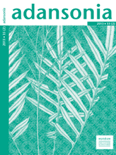
ADANSONIA
Unveiling the complexities of plant life worldwide.ADANSONIA is a distinguished, peer-reviewed open access journal dedicated to advancing the field of plant science. Published by the Publications Scientifiques du Museum in Paris since 2000, this journal serves as a critical platform for sharing innovative research and discoveries in botany, ecology, and related disciplines. With its ISSN 1280-8571 and E-ISSN 1639-4798, ADANSONIA boasts a notable Scopus rank of #383 in the Agricultural and Biological Sciences category and a 2023 category quartile ranking of Q3 in Plant Science, indicating a meaningful contribution to the academic community. The journal's scope encompasses a broad range of topics, making it a vital resource for researchers, professionals, and students alike who are exploring the complexities of plant biology. Based in France, ADANSONIA not only enhances visibility for groundbreaking research but also facilitates open communication amongst scholars, ensuring that knowledge on plant science is accessible worldwide. Located at CP 39-57, Rue Cuvier, F-75231 Paris Cedex 05, France, this journal stands as a testament to the collaborative efforts in the pursuit of scientific excellence in plant sciences.

ANNALES ZOOLOGICI FENNICI
Unlocking the Secrets of Animal Behavior and SystematicsANNALES ZOOLOGICI FENNICI, published by the Finnish Zoological Botanical Publishing Board, is a prominent scientific journal dedicated to advancing the fields of Animal Science, Zoology, Ecology, Evolution, Behavior, and Systematics. Based in Finland and serving an international audience, this journal has been an essential resource since its inception in 1974, offering valuable insights into biodiversity, conservation, and ecological dynamics. While it holds a respectable Q3 quartile ranking across several relevant categories in 2023, its impactful contributions to the scientific community continue to promote critical discussions and foster research collaborations. Although the journal is not currently open access, its robust indexing in Scopus and recognition within the academic community underscore its significance. As a researcher, professional, or student, engaging with the ANNALES ZOOLOGICI FENNICI not only enriches your knowledge but also aligns you with the forefront of zoological research and conservation studies.